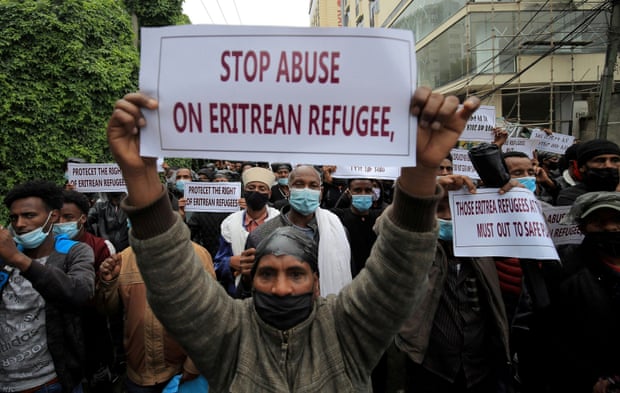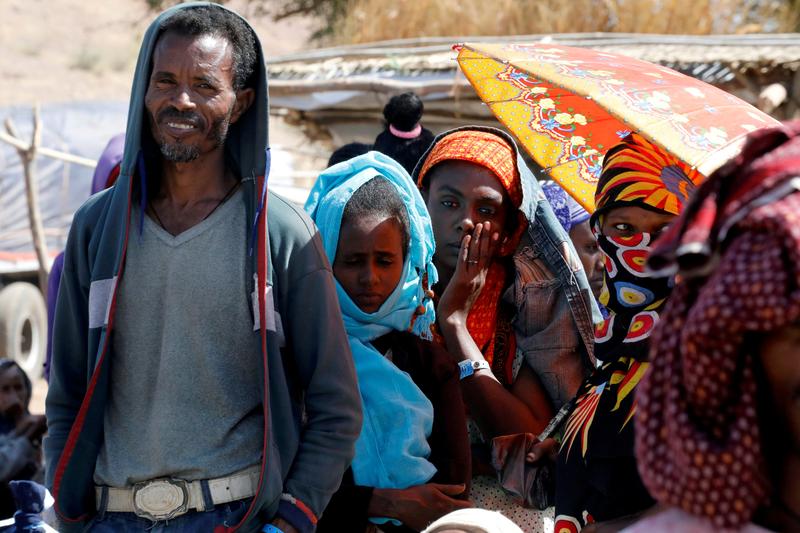DEGEHABUR (HAN) JULY 28. 2022. Public Diplomacy and Regional Stability Initiatives News. Monitoring Regional Issues. Exclusive: Tigrinya speakers say they face beatings, detention and privation, and blame UN for ‘abandoning’ them, despite right to be in Ethiopia
Eritrean refugees in Ethiopia say they are being targeted for arbitrary arrest and forcible relocation to war-torn parts of the country, despite having UN permission to remain in Ethiopia.
Government security officers are accused of rounding up, abusing and unlawfully detaining refugees who have legal status, as well as Eritreans who have foreign citizenship.
Berket*, an Eritrean-born UK citizen, said he was on holiday in the Ethiopian capital, Addis Ababa, when he took a day trip earlier this month to a religious site. Ethiopian police officers stopped his bus on the outskirts of the city. Onboard were 140 Eritreans who had been visiting a monastery.
“They rounded up only those of us who speak Tigrinya [the language of Eritreans and Tigrayans]. Other than the refugees, there were scores of Eritreans with European, Canada, US and UK passports. They took our belongings and forced us into another bus.
“They did not tell us about our ‘crime’. They would not listen when everyone showed their UNHCR [UN refugee agency] ID and passports,” said Berket.
“We refused to get into the bus since the police officers did not give us any explanation. But the officers beat and intimidated us. There was also a mob of ordinary people verbally assaulting us. We were scared.”
The group was driven to a camp in Debark, a town in the troubled Amhara region. Berket and 20 others with foreign passports were released 10 days later. The others are still being held in the Alemwach camp with thousands of other Eritrean refugees.
“It is very harsh,” said Berket. “It lacks basic facilities like water. It is scary as there are many violent militias in the area. They arbitrarily arrested me and arbitrarily released me. There is no law and order.”
In testimonies shared with the Guardian, the refugees blamed the UN refugee agency, UNHCR, for failing to protect their rights. The Guardian was shown certificates from dozens of arrested refugees proving they had valid UNHCR refugee status and a permit to live in the capital.

Yekalom*, a father of three, said he had been living and working in Addis Ababa since he fled from Eritrea in 2013. He was relocated to the camp on 9 July, and is separated from his children and wife, who remain in the city.
“I established my life in Addis, trusting UNHCR would protect my refugee rights. But it looks now like I don’t have rights at all. We did not get any explanation why we are held here, how long this will take.
“No one from UNHCR has asked us. They abandoned us. We have nowhere to go to claim our rights – there is nowhere to go to ask for protection.”
The refugees said the camp was not secure. There has been no active fighting since the withdrawal of Tigray rebels in December, during the ongoing conflict with the Ethiopian government, but those living in the camp claim bandits and local armed groups are terrorising people.
“There are many armed people. They loot and abduct people. You don’t know who is going to attack you,” said Lewam*, another refugee forcibly relocated from Addis Ababa.
“It is not even safe for the locals themselves. There is no water or food in the camp, and the shelters are in poor condition.
“I had finished the visa process and was expecting to travel to Norway last week. But now I am forced to live here, left in an uncertain situation.”
Kidan*, who had been living in Addis Ababa for seven years, said the UNHCR had failed her. “I fled to Ethiopia, relying on UNHCR promises. But the organisation is almost nonexistent these days. It is no longer protecting our rights.
“I have all the legal documents. There is no reason I should be held here,” she said.
The UNHCR in Ethiopia told the Guardian it was very concerned about the incident. “Following our intervention with the authorities, some of the individuals were able to be transferred back to Addis Ababa. We are also following up with the authorities on the remaining cases. We are working to ensure the individuals receive the necessary support,” said a spokesperson.
The office of the Ethiopian prime minister has not responded to requests for comment.
Since the war began in Ethiopia, Eritrean refugees have been subjected to abuse by all sides. Refugees were rounded up and forcibly relocated by the Ethiopian government in December 2020.
Reports suggest Tigray rebels and Eritrean forces fighting alongside the government have also been targeting refugees. In September, Human Rights Watch reported that Eritrean troops killed, “disappeared”, detained or forcibly returned Eritrean refugees to Hitsats camp in Tigray between November 2020 and January 2021.
HRW also documented indiscriminate killings and sexual violence by Tigrayan militias in the same camp. Dozens of refugees have reportedly died.
The UNHCR said in September that about 7,600 Eritreans who had been housed in Hitsats and Shimelba camps in Tigray remained unaccounted for.
* Names have been changed to protect identities

Leave a Reply